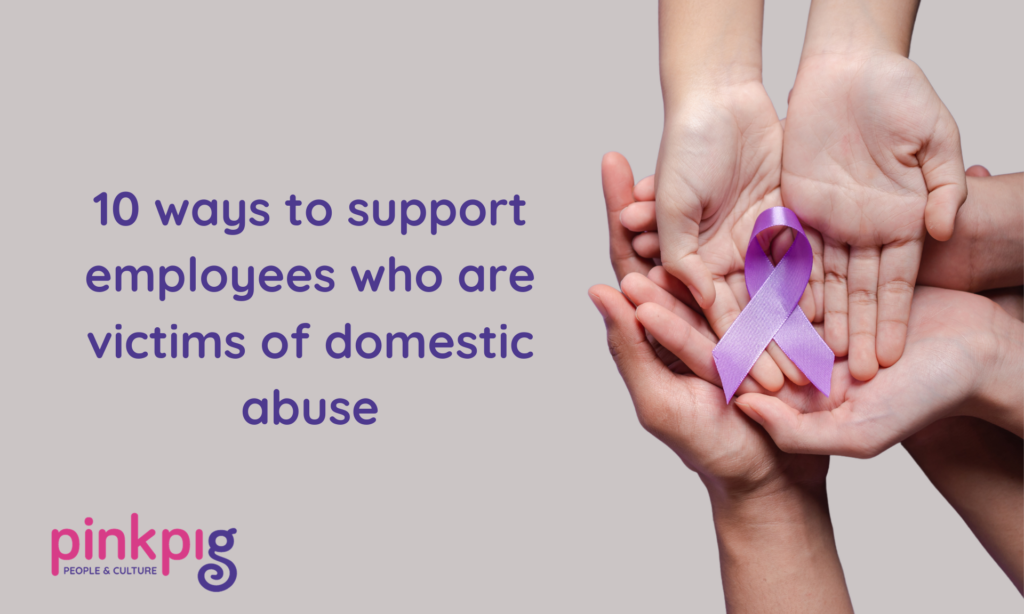If you are an employer of people, you have a duty of care to protect their wellbeing. This should cover mental health. You might do this by appointing a designated mental health first aider and providing support through employee benefit schemes that offer guidance on mental health issues. It should also cover physical wellbeing. This might be in the form of medical insurance, access to a virtual GP or other form of assistance. But do you have measures in place to support employees if they become victims of domestic abuse?
Research shows that only 5% of companies currently have a domestic abuse policy, despite 86% of companies believing they have a duty of care towards employees who are domestic abuse victims.
Many individuals, both male and female, that are a victim of domestic abuse will find that they are impacted at work. They might receive abusive calls from their partner or vicious emails. Their partner might show up at the office or workplace in the middle of the day. This is a scary situation to live through. Its consuming, distracting and can also lead to decreased productivity, affecting your employees ability to work and do their job properly.
As employers, we have a duty to safeguard the wellbeing of our staff.
We can make a real difference by implementing small but effective measures that make the employee feel safe, valued and cared for. You can create a supportive environment for them to work in but understandably, for many employers it can be difficult to know what to do and where to start.
Our founder and CEO, Cheryl Sharp has gone through a similar personal experience. Cheryl now shares her insight and advice with other companies who want to help support employees going through a similar situation.
Here she shares her 10 top tips:
1) Offer them a chance to talk
The employee is unlikely to tell you straight away that they are suffering from domestic abuse. If you suspect an employee is having hard time at home or notice a change in their demeanour, offer them a chance to talk. They may not want to tell you immediately but let them know your door is open and have regular 1-2-1 check-ins to provide them with opportunities to talk.
2) Policies & Procedures
Have policy and procedure in place to ensure employees feel comfortable raising issues at work. Share the policy widely to let employees know you can help and how they can access the support.
3) Training
Train your staff and managers on how to identify signs that an employee might be struggling. Not all scars and abuse will be physically visible.
4) Security
If you work in a physical workspace, could you put measures in place to stop the abuser from getting access to your employee at work? You could instal security keypads on entrance doors to provide an effective barrier and help them feel safer.
5) Provide a Safe Workspace
If your team works remotely, can you provide them with a space to work outside of the home? Perhaps by renting them a desk elsewhere or providing membership to a co-working space so they can get away during the day.
6) Offer Practical Support
If the employee is ready to leave their home, offer them references for a new home or rental property. Perhaps you could consider lending them the finances they need for a deposit or towards moving costs.
7) Provide Time Off
Does the employee need time off to do things like find alternative accommodation, that they can’t do when at home? Offer them time off to get things done and sort things out.
8) Help Gain Financial Independence
Offering to pay their wages into a different bank account will help them gain financial independence. This could mean the difference between them having to stay in a toxic situation and being able to leave.
9) Ask What They Need
Talk to your employee and ask them what support they need. Work together to determine what can be put into place. Offer them timescales so they know you are taking things seriously.
10) Listen Without Judgment
Listen and be there for them. Admitting they are in this situation is a big step. Sometimes the biggest help is giving them the time and space to talk about how they feel and what they are going through. Provide a private space, turn off your phone and give them the attention they need.
Sadly one in four women and one in seven men will experience some form of domestic abuse in their lifetime.
The abuse might be physical, it might be emotional, it might be both. The employee is likely to be afraid to walk away and faced with the prospect of having to rebuild their lives. Anything you can do as their employer to help ease what will be a very frightening situation can make a big difference.
Where can you turn to for more support?
Charities like EIDA also provide best practices, resources and practical guidance to help you carry out this vital duty of care.
Our founder, Cheryl Sharp, also provides support for organisations and helps them put the right policies and procedures in place to support employees. By helping to create a safe space at work, you can support survivors and enable them to grow and thrive again.
If you would like further support and guidance from Cheryl, drop us a confidential email to hello@pinkpigfinancials.co.uk
For further HR support, take a look at Pink Pig People & Culture.

